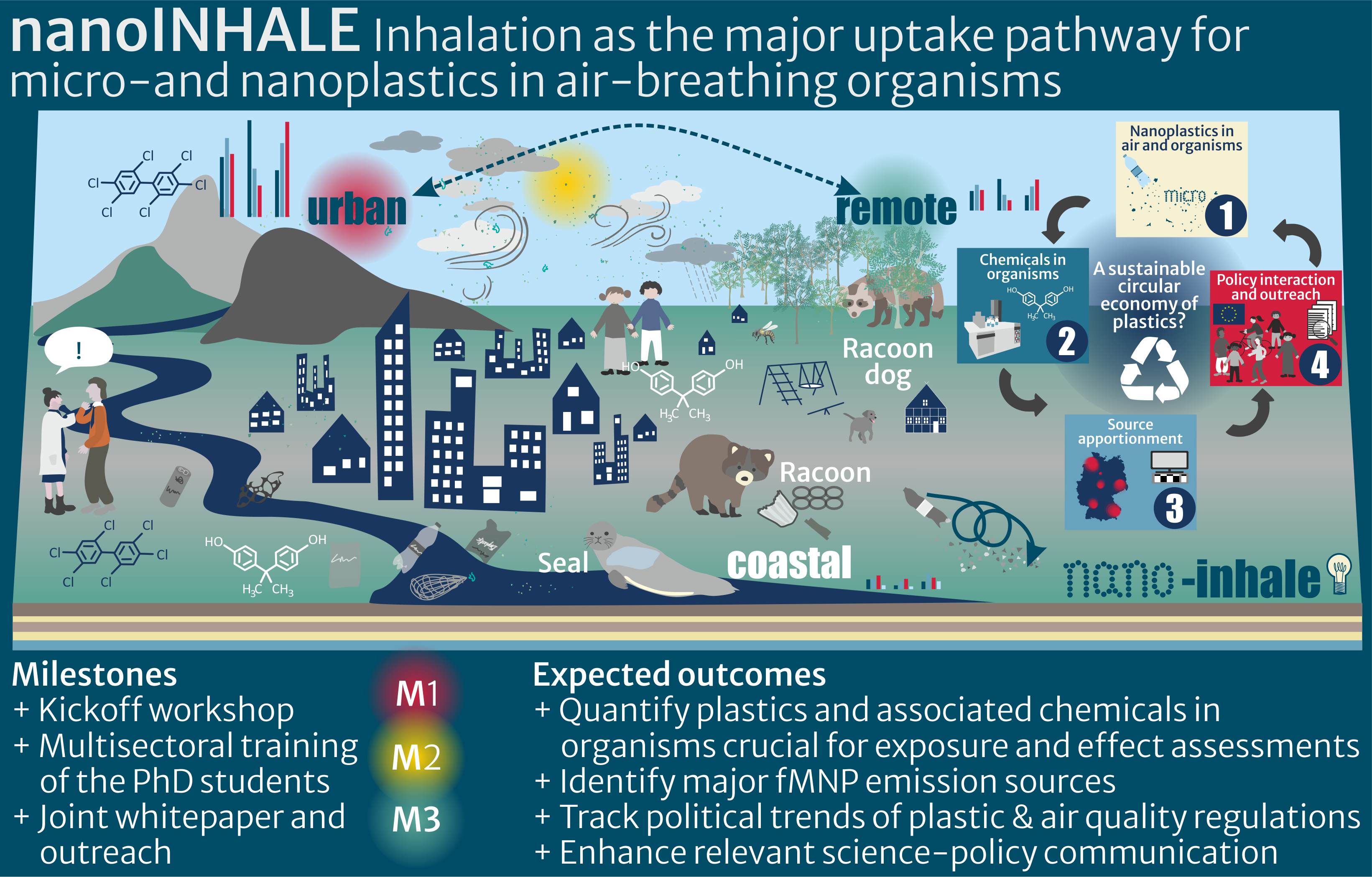PhD cohort nanoINHALE
Inhalation as the major uptake pathway for micro- and nanoplastics in air-breathing organisms

What do we aim for in nanoINHALE?
nanoINHALE aims to unravel the importance of the largely unknown plastics inhalation mechanism for (1) nanoplastics and (2) plastic-associated chemicals in air-breathing mammals, (3) identify major emission sources and transport pathways and (4) track the impacts of health risk narratives on plastic and air quality regulations. Overall, nanoINHALE contributes knowledge towards a sustainable circular economy of plastics. The project runs from 2024- 2026.
Project coordinators
Annika Jahnke (annika.jahnke[at]ufz.de)
Dušan Materić (dusan.materic[at]ufz.de)
These are the 4 topics to focus on:
Milena Latz graduated in 2023 as a Master of Chemistry and Biotechnology from a joint program of University of Leipzig and Ohio University.
Since 2024 she works as a PhD student in the Department of Environmental Chemistry in the working group Microplastics, Nanoplastics, and Elements on the topic ‘Small plastic particles go long, wide and deep’.
As a part of the nanoINHALE cohort, her work focuses on the detection and quantification of airborne nanoplastics (< 1µm) in wild animal lung tissue- and atmospheric samples. Here, she focuses on the optimization of a novel high-resolution analytical method via TD-PTR-MS, as well as on generating reproducible and reliable results for nanoplastics concentrations during sample analysis.
Supervisor: Dr. Dušan Materić
Martin Simoneit studied chemistry at the University of Leipzig and completed his master's thesis in 2023 at the former Department of Ecological Chemistry. He is currently PhD student in the Department of Exposure Science, contributing to the nanoINHALE cohort.
His research focuses on assessing whether airborne micro- and nanoplastics (MNPs) play a critical role in exposing air-breathing animals to plastic-associated chemicals in comparison to other intake routes. To achieve this, he works with lung and blubber tissues from raccoons inhabiting urban and rural areas, using LC-MS/MS and GC-MS/MS to quantify the chemicals. Additionally, his research includes leaching experiments to study the release of plastic-associated chemicals from various polymers and particle sizes, lung proteome analysis for a subset of samples, and chemoassays to evaluate the reactivity of plastic-associated chemicals with lung proteins.
Supervisor: Dr. Elisa Rojo Nieto
Thies Hamann studied physics in Berlin for his Bachelor's degree and meteorology in Leipzig for his Master's degree. In his Master's thesis, he investigated the role of vegetation on air pollution extreme events (ozone and aerosols) using atmospheric models.
He is currently PhD student in the Department Monitoring and Exploration Technologies (MET). As part of nanoINHALE, he is going to analyze the atmospheric dynamics of micro- and nanoplastic particles and identify their major sources by using the weather and climate models ICON and ICON-ART.
Supervisor: Dr. Lennart Schüler
Paula Roos studied International Relations and Public Law (B.A.) in Erfurt and completed her Masters in Political Science (Focus on Foreign Affairs & International Relations, M.A) at the University of Jena in 2024. During her studies she focussed on environmental politics on the supra and international level.
Since December 2024, Paula works as a PhD student in the Department of Environmental Politics in the working Group Governance Futures and Community Engagement.
As part of the nanoINHALE cohort, she is going to analyse how narratives and stakeholders shape the time, space and scale at which plastics in the environment are (not) discussed. Special attention will be given to airborne nanoplastic particles. Using Argumentative Discourse Analysis and Discursive Agency Approach, narratives will be analysed at the interface of the national, supranational and international level to identify leading narratives and stakeholder (groups) framing the topic.
Supervisor: Dr. Anran Luo
We are happy to answer your questions
annika.jahnke@ufz.de
surrounding the project!
